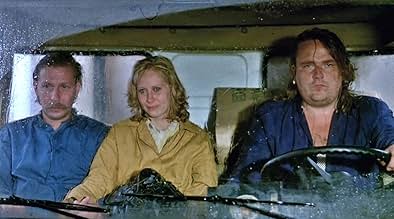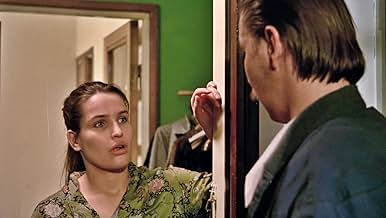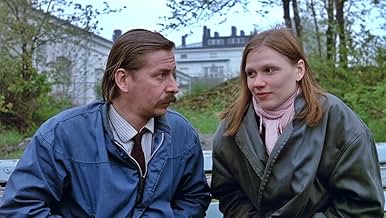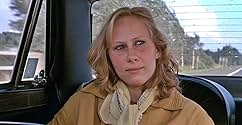VALUTAZIONE IMDb
7,4/10
8113
LA TUA VALUTAZIONE
Aggiungi una trama nella tua linguaAn episode in the life of Nikander, a garbage man, involving the death of a coworker, a love affair and much more.An episode in the life of Nikander, a garbage man, involving the death of a coworker, a love affair and much more.An episode in the life of Nikander, a garbage man, involving the death of a coworker, a love affair and much more.
- Premi
- 1 vittoria in totale
Safka Pekkonen
- Pianist
- (as Safka)
Mato Valtonen
- Pelle
- (as Markku Valtonen)
Sakke Järvenpää
- Staffan
- (as Sakari Järvenpää)
Recensioni in evidenza
The first part of AKI's "worker" trilogy is also the first time to see his works. It basically meets the expectations. The shooting is not artificial. It completely and truly restores the face of the bottom society in Finland and the various problems that men have to face in their life. In some places, people's loneliness is well interpreted, which is worthy of the word "lonely shadow" in the title. The director himself is also very handsome. He is not an ordinary actor at first sight. He looks forward to his future works.
After a stunning debut, Crime and Punishment, and a bizarre, experimental second feature, Calamari Union, Aki Kaurismäki began doing what he's best at: telling the stories of Finnish underdogs'everyday experiences. And it all started with Shadows in Paradise, the first installment of the "workers trilogy" (continued with Ariel and The Match Factory Girl), and arguably Kaurismäki's finest film (at least until he made The Man Without a Past). It also marked his first collaboration with Kati Outinen, who has become the very symbol, alongside the late Matti Pellonpää, of Kaurismäki's cinema.
Fittingly, Pellonpää and Outinen are the leading couple of shadows in Paradise. He reprises the role of Nikander he previously played in Crime and Punishment, with more English lessons (which originate his best line, at the end of the film) and trouble at work: his plans to start his own business get buried with his associate (Esko Nikkari), who commits suicide five minutes into the movie. While looking for a new job, he meets Ilona (Outinen), who works as a cashier in a Helsinki supermarket. The two start hanging out, eventually forming a sweet, if platonic, bond, occasionally threatened by Nikander's apparent cynicism.
The film's magic resides entirely in its minimalism: little dialogue, sober settings, raw, Finnish humor, real, likable characters and no overacting, as Kaurismäki tells his simple, universal, incredibly touching love story. Pellonpää and Outinen's understated, affecting performances complete each other, with valuable support from Sakari Kuosmanen as Melartin, Nikander's best friend, who even steals from his own daughter to finance his buddy's dates. Not that his behavior is exemplary, but it shows how much these people care for each other, and that's where Kaurismäki succeeds: he makes us emphasize with these characters despite their many flaws, and delivers an astounding, memorable picture.
A true masterpiece of Finnish film-making, from the best director that country has ever spawned.
Fittingly, Pellonpää and Outinen are the leading couple of shadows in Paradise. He reprises the role of Nikander he previously played in Crime and Punishment, with more English lessons (which originate his best line, at the end of the film) and trouble at work: his plans to start his own business get buried with his associate (Esko Nikkari), who commits suicide five minutes into the movie. While looking for a new job, he meets Ilona (Outinen), who works as a cashier in a Helsinki supermarket. The two start hanging out, eventually forming a sweet, if platonic, bond, occasionally threatened by Nikander's apparent cynicism.
The film's magic resides entirely in its minimalism: little dialogue, sober settings, raw, Finnish humor, real, likable characters and no overacting, as Kaurismäki tells his simple, universal, incredibly touching love story. Pellonpää and Outinen's understated, affecting performances complete each other, with valuable support from Sakari Kuosmanen as Melartin, Nikander's best friend, who even steals from his own daughter to finance his buddy's dates. Not that his behavior is exemplary, but it shows how much these people care for each other, and that's where Kaurismäki succeeds: he makes us emphasize with these characters despite their many flaws, and delivers an astounding, memorable picture.
A true masterpiece of Finnish film-making, from the best director that country has ever spawned.
Some random observations:
1. Kaurismaki's "paradise" is grimy city streets, garbage, landfills, jails, flophouses, shabby apartments. Two kinds of people inhabit this Eden: either the few, the snooty, the well off – or the subverbal, poorly educated quasi-lumpen stumbling about among the aforementioned sites. The settings, both exterior and interior, belong more to the England of "The L Shaped Room" or "Billy Liar" than to the Scandinavia of travel agency brochures.
2. Kaurismaki delivers virtuoso satire founded upon the stereotypical shy, wordless Finn. But he offers more by pushing beyond stereotype to display a deep familiarity with the kind of people he shows on the screen. An American director similarly so in tune with his people might be Kevin Smith. A possible British counterpart? Maybe Ken Loach.
3. "Shadows in Paradise" is also a testament to Kaurismaki's confidence in the cinematic medium itself, in its power to tell stories using sight and sound without principal reliance on the material of theater or literature – words. We are accustomed to the many films about how XX meets XY, where the characters express feelings, establish plot, indeed, do just about everything through words. Sometimes we even get entire orations, regardless of a film's "realistic" intent. Dialogue rules everything from the quippy screenplays of Nora Ephron or Preston Sturges to the tangly Gallic word-webs of Eric Rohmer. The similarities between Ernest Borgnine and Betsy Blair in "Marty" and Matti Pellonpaa and Kati Outinen in "Shadows in Paradise" end with "Marty's" theatrical, dialogue-soaked provenance. It would be hard to transfer this film of Kaurismaki to page or stage. The story would weaken and likely die in print or any exclusively verbal form.
4. For his comedy Kaurismaki employs a delay-deadpan technique, something familiar to anyone who has seen the "punishment" sequences in Laurel and Hardy's "Tit for Tat' (1935) or who remembers the standup routines of Jackie Vernon in the 60's. Kaurismaki's comedies – and "Shadows in Paradise" is a good example – prove the technique still achieves the desired result: laughs. And like Jackie Vernon or Laurel and Hardy, Kaurismaki makes his words just another ingredient in the comedy. They are well chosen and sometimes hilarious but enjoy no special preference.
5. The movie screened the other night on TCM with the host's caution that this is an unusual sort of romantic comedy – but why the caution? And why the need for any "category" in the first place? To call this a "romantic comedy" and then warn people about its "quirky" or "offbeat"nature does it a double disservice. The warning for possible category transgression either implies that the film is deficient for disregarding certain "rules", or cautions the audience that it will be disappointed, since the movie does things it probably won't accept. But comedy, like so many things in life generally, thrives on surprise. In "Shadows in Paradise", Kaurismaki presents modern, free, prosperous Finland as a bizarre and rather dismal place which he proceeds to mine for laughter and the occasional tear. Whatever a television host labels it, the movie manages to be funny, entertaining – and accessible.
6. A Kaurismaki movie has a distinctive "feel", as strongly trademarked as the comedies of Lubitsch or Sennett.
1. Kaurismaki's "paradise" is grimy city streets, garbage, landfills, jails, flophouses, shabby apartments. Two kinds of people inhabit this Eden: either the few, the snooty, the well off – or the subverbal, poorly educated quasi-lumpen stumbling about among the aforementioned sites. The settings, both exterior and interior, belong more to the England of "The L Shaped Room" or "Billy Liar" than to the Scandinavia of travel agency brochures.
2. Kaurismaki delivers virtuoso satire founded upon the stereotypical shy, wordless Finn. But he offers more by pushing beyond stereotype to display a deep familiarity with the kind of people he shows on the screen. An American director similarly so in tune with his people might be Kevin Smith. A possible British counterpart? Maybe Ken Loach.
3. "Shadows in Paradise" is also a testament to Kaurismaki's confidence in the cinematic medium itself, in its power to tell stories using sight and sound without principal reliance on the material of theater or literature – words. We are accustomed to the many films about how XX meets XY, where the characters express feelings, establish plot, indeed, do just about everything through words. Sometimes we even get entire orations, regardless of a film's "realistic" intent. Dialogue rules everything from the quippy screenplays of Nora Ephron or Preston Sturges to the tangly Gallic word-webs of Eric Rohmer. The similarities between Ernest Borgnine and Betsy Blair in "Marty" and Matti Pellonpaa and Kati Outinen in "Shadows in Paradise" end with "Marty's" theatrical, dialogue-soaked provenance. It would be hard to transfer this film of Kaurismaki to page or stage. The story would weaken and likely die in print or any exclusively verbal form.
4. For his comedy Kaurismaki employs a delay-deadpan technique, something familiar to anyone who has seen the "punishment" sequences in Laurel and Hardy's "Tit for Tat' (1935) or who remembers the standup routines of Jackie Vernon in the 60's. Kaurismaki's comedies – and "Shadows in Paradise" is a good example – prove the technique still achieves the desired result: laughs. And like Jackie Vernon or Laurel and Hardy, Kaurismaki makes his words just another ingredient in the comedy. They are well chosen and sometimes hilarious but enjoy no special preference.
5. The movie screened the other night on TCM with the host's caution that this is an unusual sort of romantic comedy – but why the caution? And why the need for any "category" in the first place? To call this a "romantic comedy" and then warn people about its "quirky" or "offbeat"nature does it a double disservice. The warning for possible category transgression either implies that the film is deficient for disregarding certain "rules", or cautions the audience that it will be disappointed, since the movie does things it probably won't accept. But comedy, like so many things in life generally, thrives on surprise. In "Shadows in Paradise", Kaurismaki presents modern, free, prosperous Finland as a bizarre and rather dismal place which he proceeds to mine for laughter and the occasional tear. Whatever a television host labels it, the movie manages to be funny, entertaining – and accessible.
6. A Kaurismaki movie has a distinctive "feel", as strongly trademarked as the comedies of Lubitsch or Sennett.
(1986) Shadows in Paradise/ Varjoja paratiisissa
(In Finnish with English subtitles)
DRAMA
Written and directed by Aki Kaurismäki the first of three movies of the ""Proletariat Trilogy", that introduces the odd relationship between a garbage man, Nikander (Matti Pellonpää) pursuing cashier, Ilona (Kati Outinen) at a supermarket after his friend and co-worker unexpectedly dies. As we know more about both Nikander and Ilona's daily life routines as well and the glimpse look at the customs of Finnish life, that may resort to complicated situations. Aki's purposeful stoic personalities is on purpose and it works.
Written and directed by Aki Kaurismäki the first of three movies of the ""Proletariat Trilogy", that introduces the odd relationship between a garbage man, Nikander (Matti Pellonpää) pursuing cashier, Ilona (Kati Outinen) at a supermarket after his friend and co-worker unexpectedly dies. As we know more about both Nikander and Ilona's daily life routines as well and the glimpse look at the customs of Finnish life, that may resort to complicated situations. Aki's purposeful stoic personalities is on purpose and it works.
A simpleminded garbage man and a misanthropic supermarket checkout girl find the road to romance paved with ennui in yet another of Aki Kaurismäki's patented minimal mini-dramas. The prolific Finnish director pares down the love story to its most basic components: a man, a woman, and a mood of urban alienation shaded in tones of European gray. The film is entirely negligible, but that's (presumably) all part of its charm, and what passes for a plot is merely an excuse for Kaurismäki's deadpan comic ironies. It's easy to watch and even easier to ignore, looking like a rough sketch for a minor work by a filmmaker poised for bigger things.
Lo sapevi?
- QuizTowards the end, there's a scene where Nikander's friend talks about a problematic fellow worker named Mikkonen. Matti Pellonpää, who plays Nikander here, would later play Mikkonen in Ariel (1988), the second part of the Proletariat trilogy directed by Aki Kaurismäki.
- BlooperWhen Nikander and Ilona leave the gas station and ride down the road, they pass a white car. The white car is standing still in the middle of the road. Presumably they drove so fast that they passed the white car, but it stands still.
- ConnessioniFeatured in Century of Cinema: Scandinavie, Stig Björkman (1995)
- Colonne sonoreHerbstlaub
Written by Klaus Treuheit
Performed by Klaus Treuheit
I più visti
Accedi per valutare e creare un elenco di titoli salvati per ottenere consigli personalizzati
- How long is Shadows in Paradise?Powered by Alexa
- Why is the ship to Tallinn, Estonia emblazoned with the Soviet hammer & sickle symbol?
Dettagli
Botteghino
- Lordo in tutto il mondo
- 298 USD
- Tempo di esecuzione1 ora 14 minuti
- Mix di suoni
- Proporzioni
- 1.85 : 1
Contribuisci a questa pagina
Suggerisci una modifica o aggiungi i contenuti mancanti

Divario superiore
By what name was Ombre nel paradiso (1986) officially released in India in English?
Rispondi

























